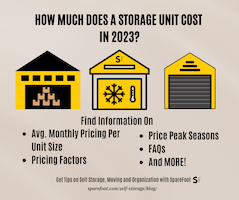When your business needs room to grow, finding the right storage solution is pivotal to managing inventory efficiently, archiving documents or simply freeing up valuable workspace.
The choice between warehouse storage and self-storage is a key decision that can greatly impact a company’s operational efficiency and bottom line. So, which one is right for your business?
While warehouse spaces typically offer large, customizable areas perfect for high-volume storage, business and commercial storage units tend to provide a more flexible, accessible option. These two distinct commercial storage solutions each come with their unique advantages and potential drawbacks.
Understanding the nuances of warehouse vs self storage is crucial to selecting the storage solution that best fits your business needs. Let’s dive into the world of business storage units, comparing warehouse storage with self-storage to help you make an informed decision.
Warehouse Storage
Warehouse storage provides a large-scale storage solution typically housed in an expansive, often customizable, area. Suited for businesses with considerable storage needs, these facilities offer the space necessary for storing large volumes of inventory or oversized items.
“Warehouses can be customized to meet the specific needs of your business, such as installing racks, shelves, and other storage systems that are tailored to your inventory,” said Brooke Green, the marketing manager at HWY 83 Storage.
Warehouse storage pros:
- Large space: Unlike self-storage units, warehouses offer an expansive area that’s ideal for businesses dealing with bulky items or significant inventory volumes. On a square foot basis, warehouses are typically cheaper than self-storage units.
- Climate control: Warehouse spaces are generally equipped with climate control features, protecting your items from extreme temperatures, humidity and other damaging environmental factors.
- Security: Enhanced security measures, including surveillance cameras, security guards and restricted access, help safeguard your inventory against theft or damage.
“For businesses with large inventory volumes, warehouses can provide a more cost-effective solution per square foot,” said Josh Riutta, a professional roofer and owner of Mikku and Sons Roofing.
Warehouse storage cons:
However, despite these notable benefits, it’s important to consider the potential drawbacks:
- Location: Warehouses are often situated in industrial areas or outside city centers, which could pose accessibility challenges if you require frequent inventory access.
- Minimum storage requirement: Some warehouse providers may require you to commit to a minimum storage space amount, potentially more than you need.
- Lack of flexibility: Warehouses may not offer the same level of flexibility as self-storage units when it come to rental terms. This poses a potential challenge if your storage needs fluctuate.
Businesses that benefit the most from warehouse storage include:
- Businesses with larger inventory requirements, such as wholesale retailers and large e-commerce businesses
- Manufacturing companies requiring storage for large machinery or parts.
- Large regional service providers with equipment storage needs
The combination of ample space, customization and strong security measures makes warehouse storage a robust choice for these high-volume businesses.
Self-Storage for Business
Self-storage is another popular storage option for businesses, offering a different set of advantages compared to warehouse storage. These facilities generally consist of individual units of various sizes that are rentable on a month to month basis. This makes for an accessible solution for businesses with fluctuating storage needs.
Self-storage for business pros and cons
| Self Storage Pros | Self Storage Cons |
| Flexibility: Self-storage units offer greater flexibility in terms of space, lease length and access, making them an excellent choice for businesses with evolving storage requirements. | Limited Space: Self-storage units may not offer sufficient space for businesses with large inventory volumes or bulky items. |
| Convenience: Typically located within urban areas, self-storage facilities are readily accessible for businesses needing frequent inventory access. | Lack of Climate Control: Not all self-storage facilities offer climate-controlled units, potentially problematic for temperature-sensitive items. |
| Security: Self-storage facilities often implement security measures such as surveillance cameras and gated access, protecting your inventory. | Limited Customization: Unlike warehouses, self-storage units may not offer extensive customization options |
Business that benefit from self-storage include:
- Small e-commerce businesses
- Local retailers and resellers
- Service providers and tradespeople with limited space for tools and supplies
- Businesses needing temporary storage during an office move or renovation
Comparing the Costs of Warehouse and Self Storage
When comparing the costs of warehouse and self-storage, several factors come into play, including rental fees, additional costs such as utilities and security and the size and location of the facility.
Warehouse Storage Costs
Warehouses often charge based on square footage, with larger spaces commanding higher fees. Additionally, warehouses might have additional costs including utilities, security and potential customization.
Warehouse leases are often triple net leases, which means the tenant is responsible for the owner’s operating expenses. This includes property taxes, maintenance and utilities, and insurance fees. Rent consists of the base rate, plus the estimated expenses for the rental period, which is typically charged either monthly or annually.
“On a per-square-foot basis, warehouses can offer better value for large-scale storage needs,” Riutta said.
Self-Storage Costs
Self-storage units are generally priced by the size of the individual unit. Costs can vary widely based on the location of the facility and the size of the unit. Unlike warehouses, self-storage units often include costs such as security in their monthly rental fee, potentially making budgeting simpler.
The location of the storage facility can also significantly impact the cost. Prime urban locations are generally more expensive than rural or suburban areas due to higher land and property costs.
Through June 2023, the average year-to-date price to rent a storage unit was $1.07 per square foot, according to SpareFoot.
Considerations When Choosing Between Warehouse and Self Storage
When deciding between warehouse and self-storage, consider the following:
- Space requirements: How much inventory do you need to store? Warehouses are ideal for larger inventory volumes, while self-storage can accommodate smaller, more flexible needs.
- Accessibility: How often do you need to access your inventory? Self-storage facilities usually offer more frequent access.
- Security needs: Both warehouses and self-storage facilities provide security, but warehouses often have more advanced measures.
- Level of business growth: Warehouses are a bigger investment, and can require a long-term commitment. The month-to-month nature of self-storage leases make them more suitable for newer businesses that are still growing.
Always ask about lease terms, security measures, additional services and potential for customization when considering different storage options.
Additional Services Offered by Storage Facilities
Both warehouse and self-storage facilities may provide extra services that can add value to your storage solution:
- Transportation: Some facilities offer pick-up and delivery services, which can save you time and resources.
- Packing and unpacking: A few facilities may provide packing and unpacking services, a beneficial feature for businesses lacking manpower or time.
- Climate-controlled storage: For sensitive items, facilities offering climate-controlled units can be a major plus, protecting your inventory from extreme temperatures or humidity.
- Business storage units with electricity: If your inventory needs power, such as for charging or temperature control, this additional service can be a game-changer.
All these services can greatly enhance the convenience and efficiency of your storage solution, so be sure to ask about them when choosing a facility.
Your Business, Your Space
Storage can make or break your business flow. It’s the capacity and robust security of a Warehouse vs Self Storage, the champion of flexibility and easy access. Your choice shapes your business destiny. Juggling costs, location, space and extra perks is your jigsaw puzzle. So, before making your pick, weigh up the pros and cons and set your business on the right track!


